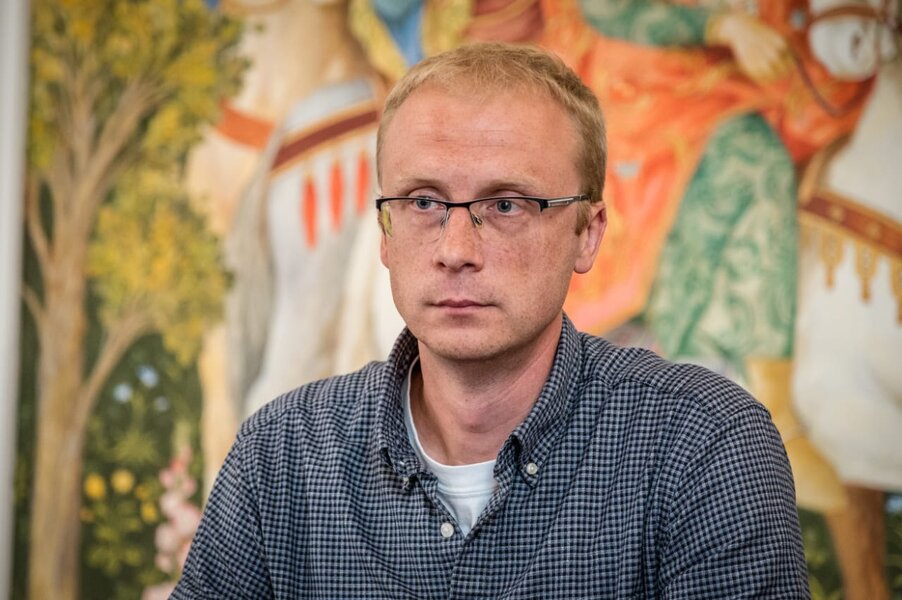Oleg Nikolenko, spokesperson for the Ministry of Foreign Affairs of Ukraine, answered questions from Cyprus Daily News.
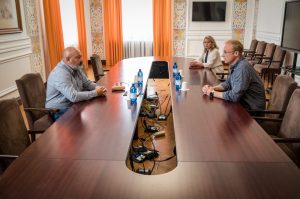
Ukrainian diplomacy has made a huge contribution to the struggle of the Ukrainian people against russian aggression. What was the most challenging part of your job at the beginning of russia’s full-scale military invasion of Ukraine and now?
I would say that the most difficult thing was to cope with emotions. I am a diplomat, and I’m a citizen at the same time. When we saw the first bombardments of Ukrainian cities and villages at the beginning of russian full fledge war, with Ukrainian children and women killed, people injured and cities destroyed, it was very hard to stay focused and to deal with emotions. But that was over very soon because I realised myself as part of the MFA team that has to stay strong emotionally as we had an important job to do – to defend our country.
And to tell you the truth the foreign ministry remained fully operational despite the first days of uncertainty and when the russian troops started bombing Borispil city, they started advancing into Hostomel city, nobody knew how the situation will develop, how the cities will be standing and how the government buildings will be operating.
After some time we evacuated people from the ministry buildings, we ordered them to leave and personnel worked remotely. Despite that we remained the foreign ministry fully operational and I think our job was quite successful.
How did the mood and attitude towards Ukraine change from the beginning of the invasion to the present day in the world?
I think we have been receiving great support from our partners. We have to go back to November last year to better understand why the present situation. In early November Foreign Minister Dmytro Kuleba came up with a comprehensive package of measures that would allow to deter russia. This package consisted of three layers – political support, economic sanctions and military assistance.
We have presented to foreign governments certain proposals about deterrence measures in November, and when the invasion began in February our partners already had their homework done. The adoption of sanctions packages was fast. It was actually unimaginable to see such a scope of sanctions from the European Union against russia, if you compare it to 2014. At that time, the response was much weaker. We are sincerely grateful to have such great partners who stand in solidarity with Ukraine and provide military, financial and humanitarian support, as well as help Ukrainian refugees. This won’t be forgotten. We truly saw how Europe is willing to help both at the level of government and at the level of people.
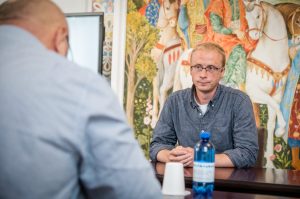
Do you now see the activity of russian lobbyists in world capitals? What is it and can their activities have a negative impact on the attitude towards Ukraine in the world?
Of course russia is trying to lobby its interests across the globe because we are at war not only on the battlefield but on diplomatic and economic levels. Russians are blackmailing Europe with soaring gas prices and this is the part of hybrid warfare that russia has launched against democratic world. They attack Ukrainian cities with cruise missiles, and they attack European cities with soaring gas prices. Russia is trying to undermine economic stability in Europe. It is also spreading propaganda aimed at undermining European societies from within to seed the mistrust in governments and to create a narrative that their policies are ineffective.
And of course they invest a lot of money to launch these campaigns. We are working with partners to see how we could better counter them.
By many indications, a significant number of people in the world still misunderstand the essence of russian aggression. Some call it, for example, a territorial dispute between russia and Ukraine. Others, echoing russian narratives, speak of russia’s alleged protection of the russian-speaking minority, which is oppressed in Ukraine. Why is this still possible and what are you doing to clarify the essence of what is happening?
It’s a myth that russia is trying to protect the russian speaking population in Ukraine. Look at the situation in the Donbas region — who got killed in the first place? Which cities have been destroyed in the first place? Who were the first refugees? It’s russian speaking population the majority of whom live in Donbas. When Russia is saying that they are protecting the russian speaking population, in reality they are killing them and destroying their lives. The russian speaking Ukrainians are the first ones who suffered from Russia’s unprovoked war.
If someone thinks that it’s a fight over territory claim, this is a myth which has nothing to do with reality. After atrocities have been revealed in Bucha, Irpin, Mariupol and other Ukrainian cities, the world saw what russia is a serial killer.
Ukraine is working on delivering true facts and explaining what’s is going on, but what russia does its very hard to cover and to hide, because all these crimes speak for themselves. Ukraine is very open to any foreign countries that are willing to contribute to the investigations, and we invited various governments and various agencies to come and investigate and document Russia’s crimes to build up on the cases in the international court.
In your opinion, does the world correctly understand the motives of russian aggression? Do European capitals understand that putin has started a war with the entire civilized world, and not just with Ukraine? Do they understand enough there that by helping Ukraine, they are saving themselves from a repetition of the events in Bucha and Mariupol on their territory?
Maybe they didn’t realise it in the full manner in 2014, but now they realise it. That’s why the support from European partners is completely different than it was back in 2014. I think now they understand that russia’s war is not merally about Ukraine, but it’s about putin’s hybrid war against Europe.
The support they are providing to Ukraine isn’t charity. They actually invest in their own security, because they understand, Ukraine is fighting not only for inself, but also for their democratic values, their freedom, their security, and their stability. It’s better to invest in Ukraine’s security and help Ukraine win, other than to counter Russia on our partners’ soil. Of course, we don’t wish to any European country to live through the horrors that happened in Ukraine, but for what we see, and what russia is trying to do, we have no doubts that putin will not stop in Ukraine, if he is not defeated and isn’t prevented in Ukraine, he will go further.
That’s why it’s important not only to remain consolidated in supporting Ukraine but also to stay united in the European Union.

In your opinion, what else needs to be done to strengthen sanctions against russia? What role should Ukrainian diplomacy play in this?
Now we see that the seventh package of sanctions is coming and we hope that it will be adopted formally in the coming days. It has new measures, some significant measures, including ban on the russian gold.
But it did not include ban on gas supplies from russia.
Unfortunately, it did not. This is something that we are working on and would love to see it in the next package of sanctions. We believe that it’s a ridiculous situation. On one hand, russia is selling gas to European markets and European countries pay significant money to Russia. Then Russia is using this money to wage war against Ukraine. Russia is funding its army, and russian army is destroying Ukrainian cities and infrastructure. And then European partners are providing Ukraine with financial assistance to rebuild the destroyed infrastructure.
Our partners are paying twice for what russians are doing. First, they pay for gas supplies, and second they pay to rebuild what russians have destroyed. This is one of the reasons why European partners should revert to alternative energy sources in order to not allow russia to continue funding its army and war against Ukraine. And the second thing is that russia is using energy as a weapon. They are cutting gas supplies to some European countries.
The continuation of work of North Stream 1 is unclear. This shows that russians are trying to undermine European Union and European countries by blackmailing with gas supplies. For their own security and for their own stability and safety, European contries have to find alternative sources of energy supply to cease dependence on russian gas. And that’s why we are explaining our partners how they can secure their own energy security with alternative routes and alternative suppliers.
We believe it’s important to introduce an embargo on Russian gas. It will help not only to stop war in Ukraine, but also secure energy independence in Europe. If the EU introduces gas embargo on russia, the war in Ukraine will stop in a few days.
What is the role of Ukrainian diplomats in the start of deliveries of Western weapons to Ukraine?
Military assistance was part of the comprehensive package of measures that Ukraine came up with in November last year and our foreign ministry under the leadership President Volodymyr Zelenskyy and his team invested a lot of efforts to bring more weapons to Ukraine.
There were few stages of Russia’s war over these five months. The first stage of war was when russians were dreaming that they were going to capture Ukraine in five days and that they will be marching across Kyiv streets in a few days. So they started the war in unconventional manner. They started the war mainly using the armored vehicles, and personnel of the ground. They were trying to advance in Kyiv outskirts to capture the capital. But since November 2021, Ukraine received significant amounts of Javelins, Stingers, Nlaws and other antitank equipment.
This weaponry was crucial in repelling those attacks, and the first stage of war Ukraine actually won over russia at that time. The Ukrainian army defeated Russians near Kyiv and they had to retreat because they were not expecting those types of weapons to be so effective. In other words, getting this military support in the first months of war was very crucial and it was a turning point.
Then russians realised they will be unsuccessful if they continue in the same way, then they switched to conventional war tactics, which is heavy artillery firing. You can see that the war now is merely about artillery fires. They fire artillery, they destroy fortifications and then try to advance on the ground with personnel and vehicles. In order to repel these attacks, we need more advanced artillery systems, MLRS, howitzers. The supply by the US of HIMARS has become a turning point for the war. It’s a game changer.
These types of weapons are making a difference on the battlefield now. And Russians were not expecting that we will be able to destroy their warehouse far from the front line. We hope that our partners will be stepping up deliveries of military equipment to enable Ukraine to liberate its territories.
What role did russian diplomacy play in preparing russia’s war against Ukraine, and are its efforts to justify this war and the war crimes of the russian army successful?
Russian diplomacy is part of the russian regime. They are responsible for inhumane crimes against the Ukrainian people. They are spreading propaganda about Ukraine, they are trying to white wash the crimes that russian army is committing in Ukraine and they are trying to blackmail governments across the world. For this reason, we don’t see any significant differences between russian diplomats and russian army. They are all part of one evil that Ukrainians are fighting against.
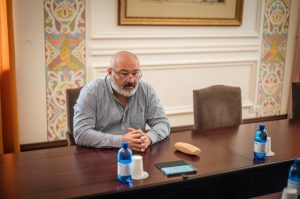
Many now say that the war will end not on the battlefield, but at the negotiating table. Do you share this point of view? Is there room for negotiations in relations with russia?
I agree that every war ends with a diplomatic solution and of course this war has to stop with a political solution. But unfortunately we don’t see any willingness from Russia to negotiate and reach a deal, because all they are doing is intensifying strikes and offensives. They are killing more Ukrainian people in the cold blood, launching attacks on civilian infrastructure, on shopping mall, clinics, killing more and more Ukrainian people, children and women. We don’t see any indications that russia would like to negotiate with Ukraine. We see that the logic of war prevails over the logic of peace in Kremlin now.
However i think that the room for negotiations will open up following the defeat of russian forces on the battlefield. The more effective the Ukrainian army will be, the more chances there will be for negotiations. If Russians see that they are losing, and that Ukraine army is gaining more and more successes, then they will be seeking to negotiate.
Ukraine has made very clear that we are willing to negotiate but not on russia’s ultimatums. What they are saying now is that they want to destroy Ukraine completely, destroy its statehood and identity. This is their only condition for negotiations. Of course this is not acceptable for us. We will be fighting as long as we can, but as i said every war should end with a peace deal and I hope that can be achieved.
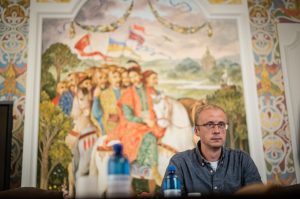
What kind of relationship do you have with your Cypriot colleagues? Do you find among them understanding and support for your efforts?
Ukraine is grateful to Cyprus for its political support, because Cyprus has been backing all rounds of sanctions within the EU. We also grateful to Cyprus for its decision to ban Russian warships from entering Cyprus ports. In the early stages of war this was crucial. We are also grateful for humanitarian support and the support in the framework of international organizations.
At the same time, we have to work on closing the loopholes for russian companies to avoid sanctions and of course we expect that all EU countries, including Cyprus, will do more to close these loopholes.
Russia, by its behavior, has taken itself outside the boundaries of the civilized world. How do you see relations between Ukraine and russia after the war?
Given all the crimes that russia has committed against the people of Ukraine, it will be impossible to forget. Putin has planted seeds for very complicated relationships between russians and Ukrainians for decades. The Ukrainian women will not forget their children killed by russian missiles. When this war will be over with Ukraine’s victory, in order to normalize the relationships the russian leadership will have to come to Ukraine to stand on its knees before the Ukrainian people and to ask for apology.
After that and after they compensate for what they have destroyed in Ukraine, and after they bear responsibility for the crimes they committed, after we return Crimea and Donbas, then we can talk about normalization of relations. But without fulfilling these conditions, it’s impossible to imagine that russians and Ukrainians can get back to normal.
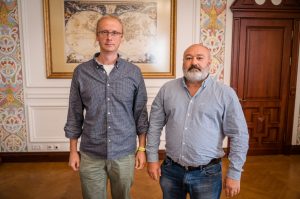
Boris Demash, specially for Cyprus Daily News
Photos by Eduard Kryzhanivskyi official photographer of the Ministry of Foreign Affairs of Ukraine
You can support us through Revolut
номер +35799960344
or PayPal
СДЕЛАТЬ ПОЖЕРТВОВАНИЕThanks for your support!

